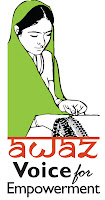After my research was complete, I was unable to devote much time to volunteering with them, but I tried to promoted fair trade as much as I could. Recently, as I was roaming around job sites, I happened upon a local fair trade retailer who was looking for an intern. After talking with Sarah, it felt serendipitous; I was so happy to be back working around fair trade ambassadors and lucky to work with an independent enterprise.

I've only been an intern with AWAZ for three months, but I have met such amazing, passionate
 people that continue to be an inspiration to me. Sarah Mitts, the wonderful AWAZ founder and entrepreneurial go-getter, shows me that you don't have to be a millionaire to make a difference in other people's lives. She lives and breathes fair trade, and inspires others to do the same. Without her hard work and dedication neither AWAZ nor the Northwest Fair Trade Coalition would be around.
people that continue to be an inspiration to me. Sarah Mitts, the wonderful AWAZ founder and entrepreneurial go-getter, shows me that you don't have to be a millionaire to make a difference in other people's lives. She lives and breathes fair trade, and inspires others to do the same. Without her hard work and dedication neither AWAZ nor the Northwest Fair Trade Coalition would be around.Amy, AWAZ's other intern, inspires me with her courage to leave her job in order to join us, travel the world, and continue her education.
Rafael of Portland's Equal Exchange continues to amaze me with his breadth of knowledge about fair trade other social justice issues, as evidenced by his GREAT talk about fair vs. direct trade after the film the other day!
I hope someday I can be as cool as these people :)
These past three months have been a great reminder to myself about why I am involved in promoting fair trade and why I will continue to support it for the rest of my life.
And just in case the above isn't enough to get you to pledge your support to buy fair trade, let me break it down for you:
- It is a economically viable alternative to free trade agreements
- It encourages individual farmers to form democratic coops, which give them the strength, power, and confidence to negotiate better prices for themselves
- Within the coops, farmers/artisans are encouraged to find their own voice and contribute to the entire process.
- A large portion of the fair trade movement is devoted to education, and not just for the children of the workers. As seen in "Black Gold", the coffee farmers didn't know how much a kilo of their coffee would be sold for in the US. Without that knowledge, farmers/artisans cannot even begin to compete in the global marketplace. Fair trade institutions address that need directly.
- Fair trade organizations FTOs) pay a social premium on top of the minimum standard wage. FTOs like Equal Exchange, for example, set a base wage that will be paid to farmers/artisans no matter what the market price is that is always above the minimum wage standard in that country. If the market price goes down, the farmer is still paid that higher price; if the market goes up, the wage paid the farmer goes up with it.
- Emphasis is put on sustainability, not profits. Sustainability in this case means cultural sustainability, economical sustainability, and environmental sustainability.
- FTOs empower traditionally disempowered groups, such as women, the disabled, and indigenous populations. It also disallows child labor and any kind of exploitative treatment.
- FTOs create long-term relationships with their coops/farmers/artisans so that those groups can be confident in a stable, consistent income.




